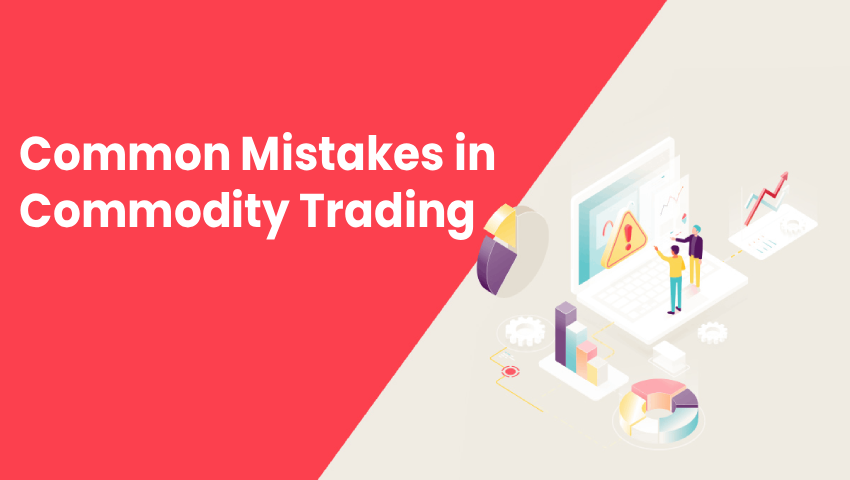
- 15/09/2025
- MyFinanceGyan
- 761 Views
- 2 Likes
- Finance
Common Mistakes in Commodity Trading and How to Avoid Them
Commodity trading is one of the most dynamic investment avenues available today. It offers investors opportunities to diversify portfolios, hedge against inflation, and benefit from global demand for raw materials like gold, oil, wheat, and coffee. Unlike stocks or bonds, commodities often move independently, providing unique profit potential. However, trading in commodities is not without risks. The markets are highly volatile, leverage can magnify both profits and losses, and external factors like geopolitics or weather conditions can impact prices overnight. Many traders, especially beginners, make avoidable mistakes that lead to losses. By identifying these pitfalls and learning strategies to overcome them, traders can build a stronger foundation for consistent profitability. This guide highlights the most common mistakes in commodity trading and provides practical tips to help you avoid them.
Mistake 1 - Insufficient Research and Understanding:
Jumping into commodity trading without understanding the basics is one of the biggest errors. Many traders overlook how commodity markets work, contract specifications, or the global events influencing prices.
Why It Happens:
- Belief that commodity trading is simple speculation.
- Over-reliance on market tips or rumors.
- Ignoring commodity-specific factors like weather or supply-demand imbalances.
How to Avoid:
- Study supply-demand data, consumption trends, and inventory reports.
- Learn contract details such as lot size, expiry dates, and margin requirements.
- Stay updated with reliable news on global markets.
- Use educational resources, online courses, and demo platforms before risking real money.
Mistake 2 - Ignoring Risk Management:
Not using stop-loss orders or trading without a risk plan can quickly wipe out capital.
Why It Happens:
- Overconfidence or greed.
- Hope that the market will “bounce back.”
- Emotional attachment to trades.
How to Avoid:
- Always set stop-loss levels before entering a trade.
- Use trailing stops to lock in profits.
- Risk only a small percentage (1–2%) of total capital per trade.
- Exit trades when stop-loss triggers, without hesitation.
Mistake 3 - Overtrading and Chasing Prices:
Many traders enter and exit trades excessively, either due to fear of missing out (FOMO) or the desire for quick profits. This often results in higher costs and lower returns.
Why It Happens:
- Emotional decision-making.
- Reacting impulsively to market news or rumors.
- Lack of a structured trading strategy.
How to Avoid:
- Create a trading plan with defined entry and exit points.
- Focus only on high-probability setups.
- Avoid reacting to every price fluctuation.
- Keep a trading journal to evaluate performance.
Mistake 4 - Lack of Diversification:
Putting all your money into one commodity, like crude oil or gold, can magnify risks if the market moves against you.
Why It Happens:
- Strong bias toward a particular commodity.
- Misunderstanding of diversification benefits.
- Overconfidence in a single trade.
How to Avoid:
- Spread capital across multiple commodities—metals, energy, and agriculture.
- Use different trading strategies for balance.
- Allocate capital based on risk profiles.
Mistake 5 - Unrealistic Expectations:
Many beginners expect instant profits, leading to frustration and poor decision-making.
Why It Happens:
- Commodities’ volatility tempts traders into chasing quick gains.
- Lack of awareness about market cycles.
- Setting goals without accounting for risks.
How to Avoid:
- Set achievable profit targets based on past market performance.
- Learn about seasonality and cyclical patterns in commodities.
- Start small to build confidence and experience.
- Practice patience—good trades take time to develop.
Mistake 6 - Ignoring Market Trends:
Trading against prevailing trends without technical confirmation often results in losses.
Why It Happens:
- Reliance on gut feeling or unverified tips.
- Overconfidence in personal opinion.
- Lack of technical analysis.
How to Avoid:
- Use technical indicators such as Moving Averages, RSI, or MACD.
- Trade in the direction of the trend.
- Confirm trades using multiple signals.
- Reassess market direction regularly.
Mistake 7 - Holding Positions Overnight Without Planning:
Keeping trades open overnight without evaluating global risks can expose traders to large losses from sudden events.
Why It Happens:
- Ignoring after-hours developments.
- Trying to avoid additional trading costs.
- Inadequate risk management.
How to Avoid:
- Track global news and economic reports.
- Use stop-loss orders for protection.
- Hold overnight positions only if risks are understood.
- Prepare for potential gap openings at market open.
Mistake 8 - Overuse of Leverage:
Leverage is a double-edged sword—it can boost profits but also magnify losses. Many traders misuse it, leading to margin calls.
Why It Happens:
- Temptation to maximize returns with little capital.
- Poor knowledge of leverage mechanics.
- Inadequate capital allocation.
How to Avoid:
- Use leverage conservatively.
- Maintain cash reserves for margin calls.
- Trade only with money you can afford to lose.
- Educate yourself on how margin works.
Mistake 9 - Ignoring Transaction Costs:
Even small brokerage and exchange fees can erode profits when trading frequently.
Why It Happens:
- Focus only on gross profits.
- Lack of cost calculation in trade planning.
- Excessive short-term trading.
How to Avoid:
- Choose brokers with competitive fee structures.
- Include costs in profit and risk calculations.
- Reduce unnecessary trades.
- Use limit orders to minimize spread costs.
Mistake 10 - Trading Without a Plan:
Trading based on emotions or random tips usually leads to inconsistent outcomes.
Why It Happens:
- Entering trades impulsively.
- Lack of discipline.
- Absence of predefined rules.
How to Avoid:
- Write down a detailed trading plan with entry, exit, and risk rules.
- Stick to your plan regardless of emotions.
- Review and update your strategy regularly.
- Keep a trading journal to track mistakes and progress.
Quick Reference Table:
Conclusion:
Commodity trading is both rewarding and challenging. Success doesn’t come from luck or guesswork but from knowledge, discipline, and effective risk management. Most losses can be traced back to avoidable mistakes like poor planning, ignoring risks, or chasing quick profits. By understanding these pitfalls and adopting disciplined strategies, traders can significantly improve their chances of consistent success. Remember, long-term profitability in commodities requires patience, strategy, and careful execution.
Disclaimer: The views expressed in this article are personal and intended solely for educational purposes. They are not financial advice or product recommendations.



